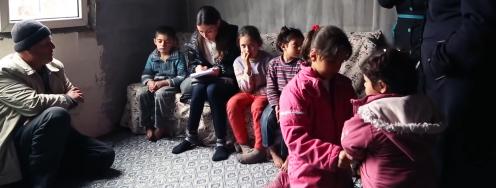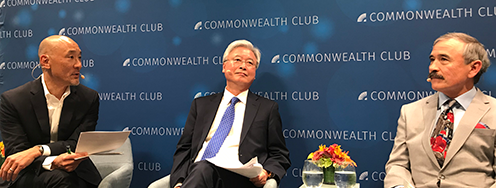A Man With a Clear Conscience
He warned us. On Jan. 27, 2003, Mohamed ElBaradei told the United Nations Security Council that his initial inspections had revealed no evidence of nuclear-weapons activities in Iraq. The next day, ignoring this new intelligence, President George W. Bush presented an urgent case for military action in his State of the Union address, and The New York Times, The Washington Post , and most leading experts followed Bush’s lead: Saddam was building a bomb, and war was the only way to stop him.
By January 2005, the official U.S. inquiry by the Iraq Survey Group would verify ElBaradei’s findings: Iraq had no weapons of mass destruction and no program to produce them, and it was not making any “concerted efforts to restart [its earlier] program.” By then, the war was entering its third year.
In his new memoir, The Age of Deception , ElBaradei grapples with some tough issues, but none brings out his passion more than the Iraq War. As the director general of the International Atomic Energy Agency (IAEA), a Nobel laureate, and now a player in Egypt’s new politics, ElBaradei has had major roles in a series of events with global ramifications. This behind-the-scenes view provides new details of key nuclear dramas, including North Korea’s nuclear program, the high-tech bazaar of Pakistan’s A.Q. Khan, and the controversial inspections of Iran.
Readers, however, will likely find the opening chapters on the 2003 struggle over Iraq the most gripping. ElBaradei reminds us how “Western officials and media pundits … were pointing to circumstantial what-ifs and characterizing them as proof.” He quotes Vice President Dick Cheney’s ominous warning to him during an early White House meeting that Cheney was “ready to discredit the inspections in order to disarm Iraq.” That, of course, is what the administration did when, as one Bush official declared on March 3, 2003, “The inspections have turned out to be a trap.” Secretary of Defense Donald Rumsfeld portrayed ElBaradei as a bumbling Inspector Clouseau and contemptuously claimed, “We know where they [Iraq’s nuclear weapons] are.”
In his final report to the U.N. Security Council on March 7, 2003, ElBaradei demolished the central pillars of the administration’s case for war: The famous aluminum tubes were not appropriate for centrifuges; the documents showing Iraq was importing yellow cake from Niger were forgeries; Iraq’s capabilities had deteriorated, not improved. But to this day, the architects of the Iraq War say that faulty intelligence misled them. In an interview on Fox last February, Sean Hannity asked Rumsfeld, “How did we get it wrong on weapons of mass destruction?” Rumsfeld replied, “Our intelligence community, the CIA, and the entire community, concluded that he had them. So, too, did the intelligence communities of other nations. And it was a perfectly rational, reasonable judgment, in my view.”
This is simply not true. The U.N. inspectors provided accurate intelligence, and the Bush administration chose to ignore it. In an onstage interview at a conference in November 2005, I asked ElBaradei how he felt about the everyone-got-it-wrong excuse. “I simply was reading the data we were getting,” he replied. “I remember my last statement to the Security Council when I said I needed three more months. And I remember I said, clearly, this would be an investment in peace. It didn’t work out that way, but at least my conscience is clear.” Not many in the Bush administration can honestly say as much.
Bush officials never forgave ElBaradei for his actions, trying—and failing—to block his re-election for a final term as head of the IAEA and denouncing him for being “soft” on Iran. Others continue their criticisms in reviews of Deception. Leslie Gelb, who supported the Iraq War as head of the Council of Foreign Relations and now urges tougher action against Iran, writes in The New York Times that ElBaradei “exhibits more sympathy for non-Western proliferators and their needs than for the major powers and their security and political concerns. At times, his narrative comes close to condoning the motives of states that seek nuclear weapons.”
The object of Gelb’s ire is ElBaradei’s belief that “punitive actions, actions that fail to address the underlying reasons for a country’s pursuit of nuclear development, did not constitute a policy—nor, in any pragmatic sense, a strategy—and would at most delay a nuclear weapon program.” History appears to bear out this view. The Bush policy of no negotiations with Iran and threats of military strikes accelerated Iran’s nuclear program, which advanced more during the Bush administration than it had during the previous three administrations combined. President Barack Obama’s policy of engagement, sanctions, and sabotage has slowed Iran’s program, but Obama also needs to use diplomacy—as ElBaradei and other experts say—to address the concerns about security and prestige that are driving Iran. Other nations have been persuaded or induced to end their nuclear-weapons programs; none has been coerced into doing so.
In his book, ElBaradei also dwells on the wider dangers of nuclear proliferation and urges moves toward global nuclear disarmament. “If we do nothing, attempting to maintain the status quo of nuclear haves and have-nots,” he writes, “the change will likely take the form of a veritable cascade of proliferation, or worse still, a series of nuclear exchanges.”
In fact, the elimination of nuclear weapons is official policy in the United States. Obama’s 2010 Nuclear Posture Review reaffirms that the nation’s goal is to seek “the peace and security of a world without nuclear weapons” by steadily reducing their numbers. The joint work of two former Republican secretaries of state, George Shultz and Henry Kissinger, with Democrats Sam Nunn and William Perry, testifies to the bipartisan potential of measures reducing reliance on nuclear weapons. That consensus does not extend, however, to current members of Congress, nor is it reflected in Pentagon programs that will spend $300 billion over the next decade on the very weapons Obama says he wants to make less relevant.
Whether in bombs or reactors, nuclear technology is inherently unsafe and a challenge that can be met only through international cooperation. ElBaradei argues for the development of “an alternate system of collective security,” built on “strong, responsive multinational institutions.” On the nuclear front, collective security means accelerating efforts begun last year by Obama and 50 global leaders to secure all bomb materials as tightly as we secure the gold in Fort Knox. Security requires moving more quickly to reduce the U.S. and Russian nuclear arsenals (95 percent of global totals) and setting up a “fuel bank” that can offer nations an assured supply of nuclear-reactor fuel, obviating the need for countries to build their own fuel factories that can be turned all too easily into bomb factories.
Many ignored ElBaradei when he tried to stop a war. Maybe this time we should listen.



